#Polyester Yarn
Explore tagged Tumblr posts
Text




Fox the second
a little more fancy, a little less ugly (except for the eyes but it's whatever, not necessarily a skill issue but a button issue)
the top hat pattern loosely based on a YouTube video by Theresa's Crochet Shop (and by loosely I mean I freehanded most of it once I got the gist of how to make the edges)
the star based on a YouTube video by Avocado Handmade
#crochet fox#crochet plushie#beginner crochet#crocheting#crochet#crochet hat#ill most likely regret putting wire inside of it#but it refused to stand otherwise#wire hates me#most craft materials hate me#and i hate them#yarn crafts#yarn#fiber crafts#fiber art#polyester#polyester yarn#its shitty#but stiff#and cheap#redoing is a nightmare tho
2 notes
·
View notes
Text
Best Polyester Yarn Suppliers in Australia
Searching for the Best Polyester Yarn Suppliers in Australia ? JASV EXPORTS offers premium-quality polyester yarns tailored to meet diverse industrial and fashion needs. Renowned as one of the Best Polyester Yarn Suppliers in Canberra , they provide consistent quality and reliable delivery to clients across the region . Read more….
0 notes
Text
Applications of Recycled Polyester Yarn in Fashion and Textiles

Recycled polyester yarn has emerged as a transformative material in the fashion and textile industries, offering a sustainable alternative to conventional polyester. This article explores the diverse applications of recycled polyester yarn, highlighting its environmental benefits and versatility in various textile products. Additionally, we will touch upon the applications of recycled nylon yarn to provide a comprehensive view of sustainable textile options.
Sustainable Production Processes
Manufacturing Process Overview
Recycled polyester yarn is produced through a meticulous process that begins with collecting post-consumer PET bottles. These bottles undergo sorting, cleaning, and shredding to produce PET flakes. Subsequently, these flakes are melted and extruded into yarn fibers, which are then spun into high-quality yarn suitable for textile production.
Environmental Impact
The production of recycled polyester yarn significantly reduces the carbon footprint compared to virgin polyester. It consumes less energy, reduces greenhouse gas emissions, and conserves natural resources such as water and petroleum. By diverting plastic waste from landfills and oceans, recycled polyester contributes to a circular economy model, fostering sustainability in the fashion industry.
Applications of Recycled Nylon Yarn
Recycled nylon yarn shares similar sustainable production processes with recycled polyester yarn. It is derived from post-consumer nylon waste, including discarded fishing nets and industrial waste. The recycling process involves cleaning, shredding, and extruding the nylon waste into fibers, which are then spun into yarn. Recycled nylon yarn offers comparable environmental benefits and is used in various textile applications, particularly where durability and performance are crucial.
Applications in Fashion
Apparel
Recycled polyester yarn is increasingly used in the production of apparel, ranging from activewear and outerwear to everyday clothing. Its durability, moisture-wicking properties, and ease of dyeing make it a preferred choice among designers and manufacturers committed to sustainable practices. Brands are integrating recycled polyester yarn into their collections to meet consumer demand for eco-friendly fashion options without compromising on performance or style.
Accessories
In addition to apparel, recycled polyester yarn is utilized in accessories such as bags, belts, and footwear. These accessories benefit from the material's strength, resilience, and color retention properties, ensuring longevity and reduced environmental impact compared to traditional synthetic materials.
Applications in Textiles
Home Furnishings
Recycled polyester yarn finds extensive applications in home textiles, including upholstery, curtains, and bedding. Its ability to mimic natural fibers like cotton and wool while offering enhanced durability and stain resistance makes it a preferred choice for sustainable interior design solutions. Manufacturers are increasingly incorporating recycled polyester yarn into their product lines to cater to environmentally conscious consumers seeking stylish and eco-friendly home furnishings.
Industrial Textiles
Industrial applications of recycled polyester yarn include automotive textiles, geotextiles, and filtration materials. The material's strength, UV resistance, and moisture management capabilities make it suitable for demanding environments where performance and longevity are crucial. Industries are adopting recycled polyester yarn to achieve sustainability goals and meet regulatory standards without compromising on product quality.
Conclusion
Recycled polyester yarn and recycled nylon yarn represent pivotal innovations in the fashion and textile industries, offering sustainable solutions to the challenges posed by conventional synthetic fibers. Their versatile applications span from apparel and accessories to home furnishings and industrial textiles, driven by their environmental benefits and performance characteristics. As consumer awareness and demand for sustainable products continue to rise, recycled polyester and nylon yarns are poised to play increasingly integral roles in shaping the future of textiles worldwide.
#Recycled Polyester Yarn#Polyester Yarn#Recycled Yarn#recycled nylon yarn#reliance nippon life insurance
0 notes
Text
The Future of Sustainable Textiles: Recycled Polyester Yarn
Recycled polyester yarn is revolutionizing the textile industry by transforming plastic waste into high-quality fabric. This material reduces landfill burden and minimizes environmental impact, aligning with the rising global demand for sustainable products.
Understanding Recycled Polyester Yarn
What is Recycled Polyester Yarn?
Recycled polyester yarn, or rPET (recycled polyethylene terephthalate), is made from post-consumer plastic products like PET bottles. The process involves collecting, cleaning, shredding, melting, and spinning these plastics into new polyester fibers that can be woven or knitted into fabrics.
The Manufacturing Process
Collection and Sorting: Plastic bottles are collected and sorted.
Cleaning and Shredding: Bottles are cleaned and shredded into flakes.
Melting and Extrusion: Flakes are melted and extruded into filaments.
Spinning: Filaments are spun into yarn for fabric production.
Advantages of Recycled Polyester Yarn
Environmental Benefits
Waste Reduction: Recycled polyester helps reduce plastic waste in landfills and oceans.
Energy Efficiency: Producing rPET uses less energy than virgin polyester, lowering greenhouse gas emissions.
Resource Conservation: Reduces reliance on petroleum, a non-renewable resource.
Performance Benefits
Durability: Recycled polyester retains the strength and durability of virgin polyester.
Versatility: Suitable for various textile products, including clothing, home textiles, and industrial fabrics.
Cost-Effectiveness: Improving technology and infrastructure are making rPET more competitive with traditional polyester.
Applications of Recycled Polyester Yarn
Fashion and Apparel
Recycled polyester is popular in fashion for its sustainability and performance. It is used in everyday wear and high-performance athletic apparel, with leading brands integrating rPET to meet eco-friendly demands.
Home Textiles
Recycled polyester is used in bedding, curtains, and upholstery. Its durability and ease of maintenance make it ideal for sustainable home design.
Industrial Uses
Recycled polyester yarn is also used in geotextiles, automotive fabrics, and insulation materials due to its strength and resilience.
Challenges and Future Outlook
Challenges
Quality Consistency: Variability in source materials can affect quality consistency.
Market Penetration: rPET faces competition from cheaper virgin polyester products.
Consumer Awareness: Increasing awareness and acceptance of recycled materials is essential.
Future Outlook
The future of recycled polyester yarn is bright, driven by technological advancements and growing environmental consciousness. Innovations in recycling processes and collection systems will enhance the quality and availability of rPET. As consumer demand for sustainability grows, recycled polyester yarn will play a crucial role in a greener textile industry.
Conclusion
Recycled polyester yarn is a significant advancement towards sustainable textile production. By converting waste into valuable resources, it mitigates environmental impact and offers a durable, versatile material for various applications. Embracing recycled polyester is vital for a sustainable future.
0 notes
Text
"Good for the planet, good for your projects: Recycled Cotton Yarn."
#best polyester yarn companies in india#cotton fiber yarn#recycled cotton yarn#cotton weaving yarn#cheapest place to buy yarn#buy sustainable yarn online in india#fiber weaving products#weaving yarn#buy weaving yarn online in india#best quality dyed yarns#recycledcottonyarn#knitting#sustainability#ecofriendly#diy
17 notes
·
View notes
Text
Yaaay my new shelves arrive today and I might actually get all my yarn put away. The art cabineting....2!
Come to my home if you need any fucking art supplies. Anyone who asks for something is led by the hand into my in-home Michael's and receives a deranged tour thru the trenches. I contained the traditional art supplies....I WILL subdue the yarn
#Creepy chatter#I like to have 1-2 skeins of each color in a certain yarn I use so I can just pluck a skein + get to work#Hate supply shopping for every project lol...#You get every prismacolor pencil and it fits in a 10 inch case#You get (most) colors from a polyester plushie yarn and suddenly it pays rent and needs its own bathroom#Casting kallax on ye
7 notes
·
View notes
Text
yay i finished my socks. had to sew little gathers into the ankle area though cause i made it too big there 😔👍 changed around my sock recipe so next ones should be fixed in that area this time. we'll see. cast on a lovely colorway called friendship bracelet for the newest pair of socks
#this is the 4th pair of socks ive made! very fun#extremely comfortable hehe. the colorway is growing on me. i have enough for a second pair of socks in this yarn if i want#want to finish my friendship bracelet socks first tho. then i can go back and make another pair of the ones i just finished#not a horse#wont post what they look like the gathers are really noticable 🤡#slowly making replacements for all my under ankle socks so i can get rid of the old ass polyester ones ive had for years#i dont think i can darn my old socks anymore 🤡 but i also dont want to buy any more polyester socks#i can buy sturdy yarn and make a whole bunch of socks that fit perfectly and are comfortable in cotton yarns yknow??#i dont wanna wear polyester man. bad texture
9 notes
·
View notes
Text

Finished the laptop bag. Focused so hard I got a nosebleed
#crochet hooks#crochet#crochet bag#crochet laptop case#double crochet#slip stitch#half double crochet#yarnblr#yarn craft#acrylic yarn#yarn#yarn crafts#wool#polyester#fiber crafts#crafts#fiber craft#craftblr#handmade
6 notes
·
View notes
Text


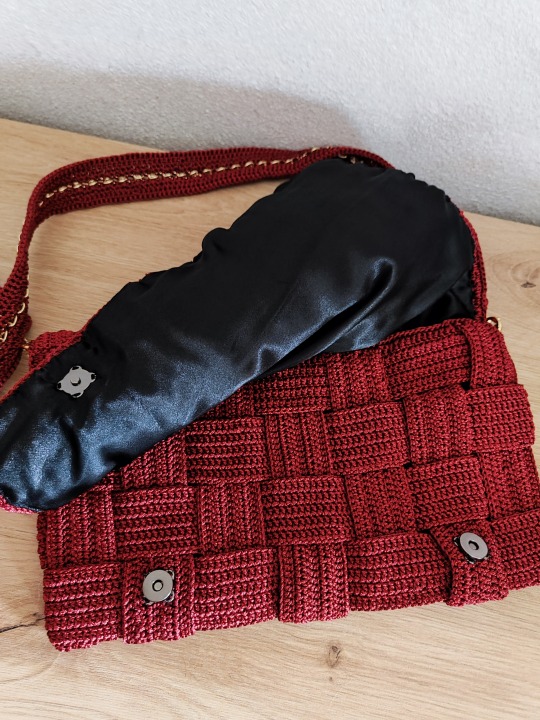


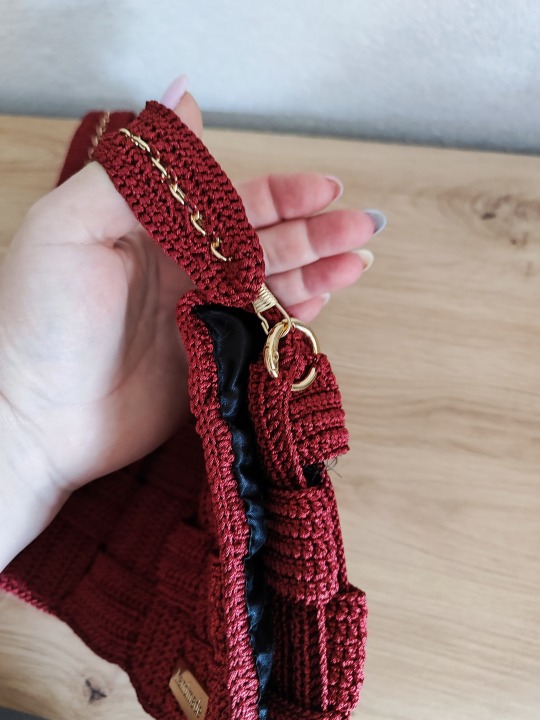


Handmade Burgundy Crochet Bag – Convertible Shoulder to Clutch – Elegant Tote for Evening or Day Out – Eco Friendly Polyester Yarn
#handmade bag#crochet bag#burgundy bag#eco friendly bag#polyester yarn bag#gift for her#women accessory#shoulder bag#handmade tote#boho bag#stylish bag#evening clutch#diy#home & lifestyle
2 notes
·
View notes
Text

Finished a baby hat
Size: Medium (3-6 months)
Color: Charcoal
Yarn type: Polyester 🧶
#etsy#etsyseller#etsyshop#etsystore#handcrafted#handmade#small business#baby hat#polyester#yarn crafts#yarn#yarnblr#crochet yarn#crocheting#crochet#fiber crafts#ko fi
3 notes
·
View notes
Text

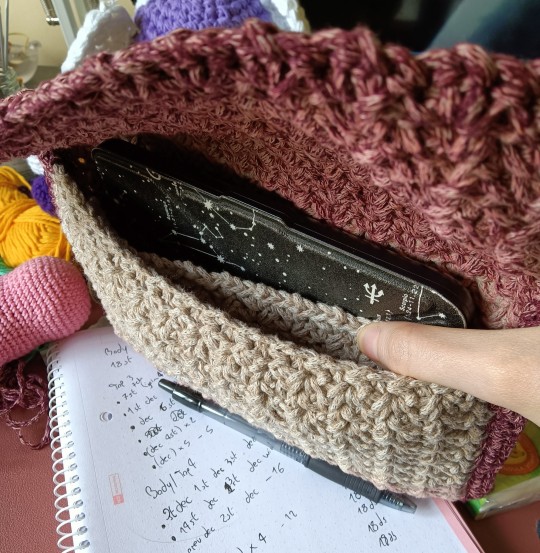
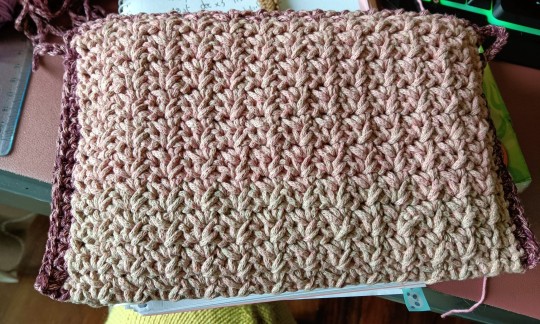
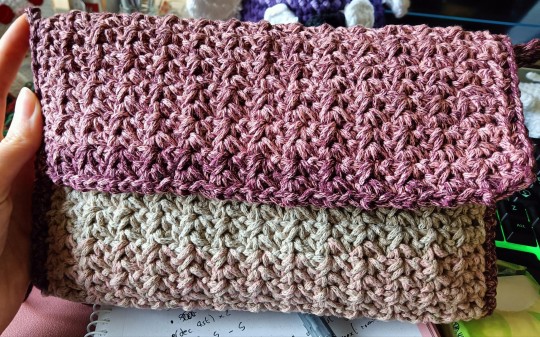
Finished a bag I've made exactly to fit my e-reader because at home I only have huge bags or too tiny to bring the ereader without me freaking out. I've even made a pocket to put the ereader separated from everything else. I just hhhhh need to make a shoulder strap now
#made using a skein of dmc nova vita and all in spider stitch#this cotton was a pain in the ass to work because it's rigid as fuck even if I've used the hook a size larger thak what's written but it's#perfect for a bag#80% cotton and 20% polyester SEE I'M NOT ALWAYS A YARN SNOB I DO USE NOT NATURAL FIBERS WHEN IT MAKES SENSE#crochet
12 notes
·
View notes
Text
i dont know if i ever mentioned on here that ive been learning how to loom knit. very slowly, as with all things, bc i tend to put things down and leave them unfinished for months and years
but tonight i finally finished my very first scarf!!!! it took over a year of real time, but around 21 cumulative hours. heres some progress pics:

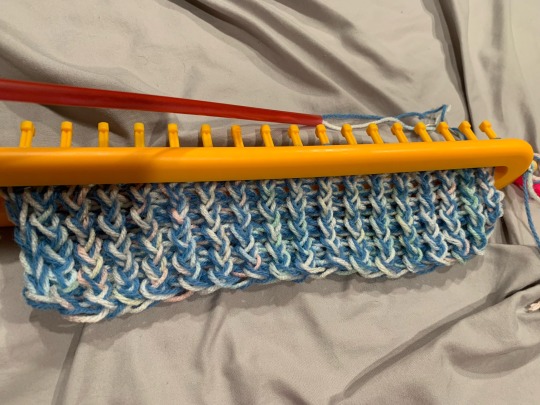
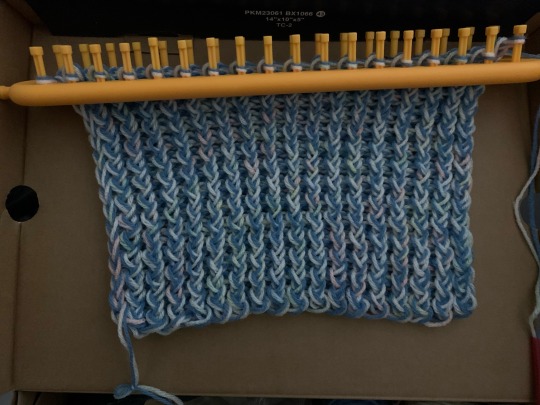
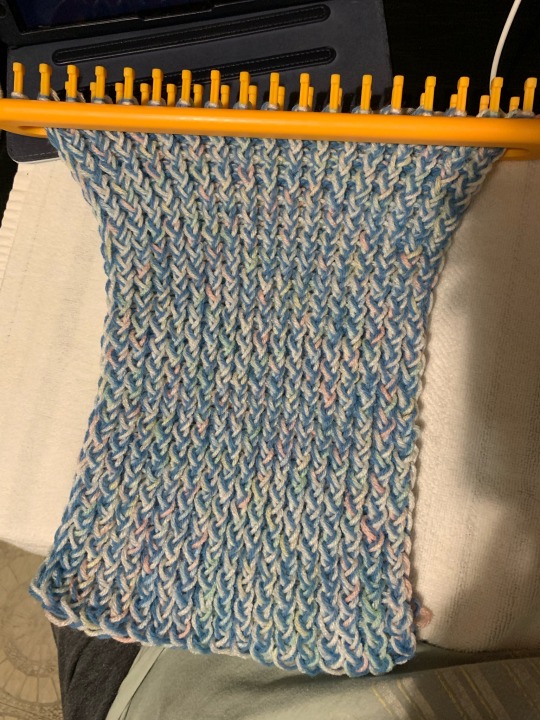
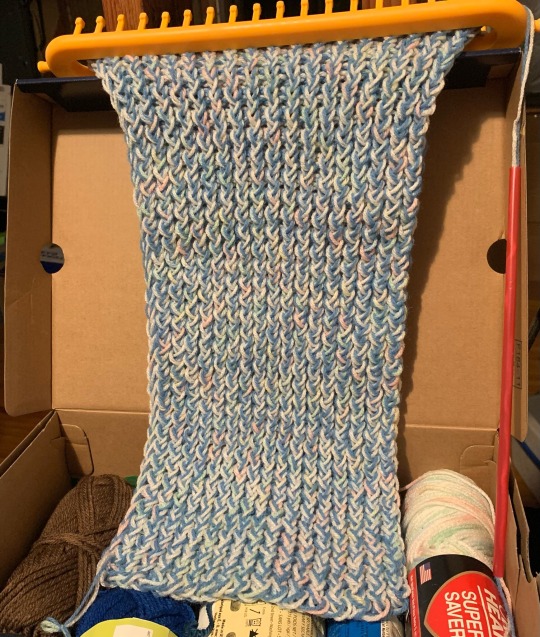
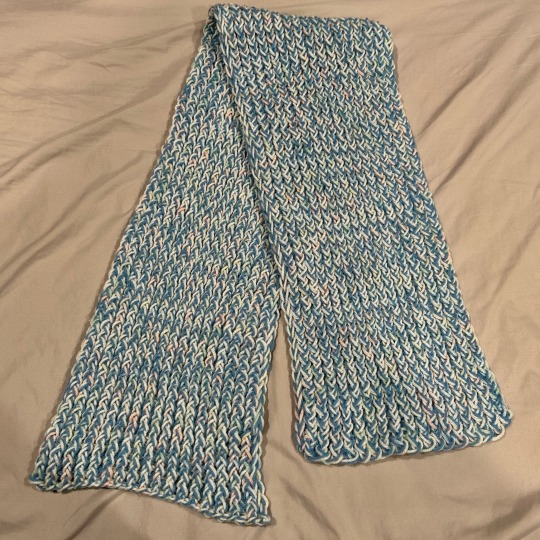
i didnt really have a plan for how long i wanted it to be, i just kept going until i reached the end of the skeins. it ended up being 42 inches long- but its also very stretchy!
since starting this thing, i have found more looms like this at the thrift store and accumulated a nice little pile of yarn for myself, but i havent begun a second project yet bc im deciding what i want to learn next. probably how to switch up colors and patterns in the middle of a project. so ill see u in 2026 for the results of that 😆
#i talk about life n stuff#things i made#knitting#the colors are a lot softer and cuter than the pictures are capable of showing. but its kinda scratchy bc its polyester/acrylic#the majority of the yarn i find in thrift stores tend to be synthetic. so i dont think ill be making clothes from them#mayhaps some kind of tubular creature using the round loom
6 notes
·
View notes
Text
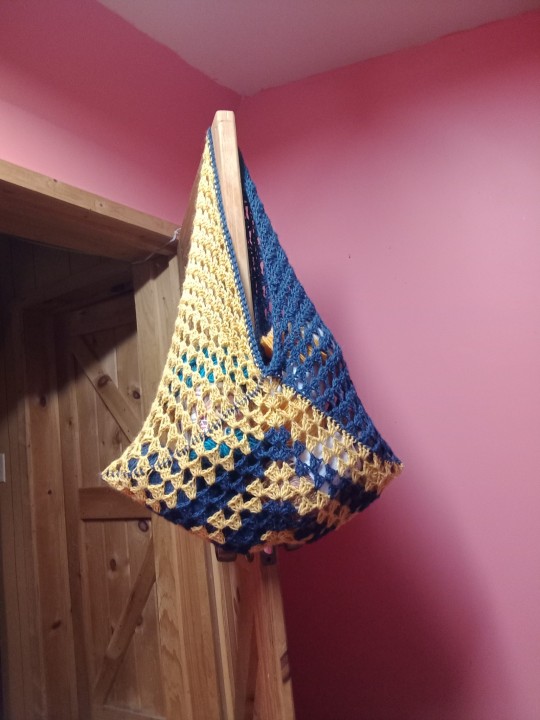
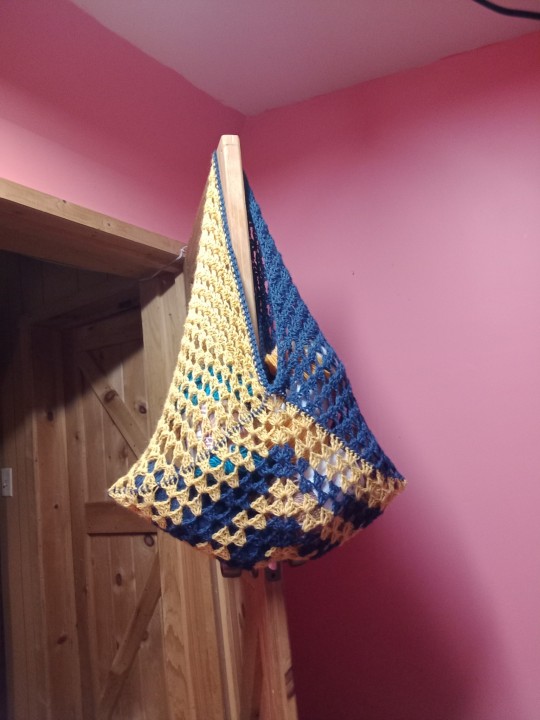
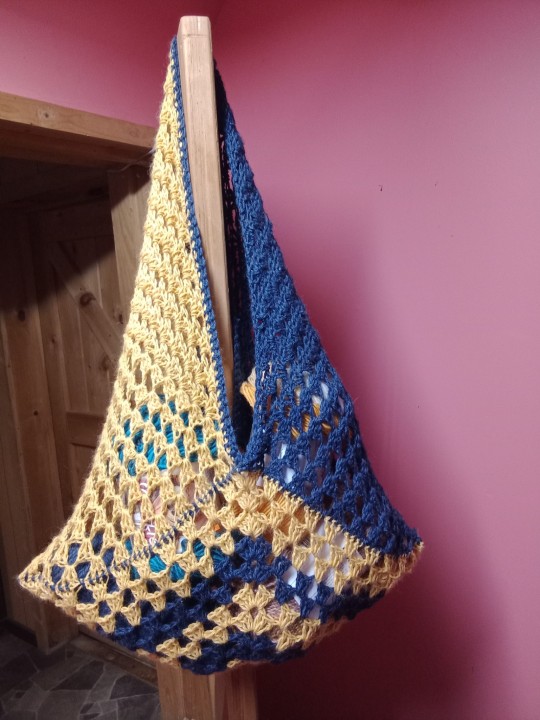
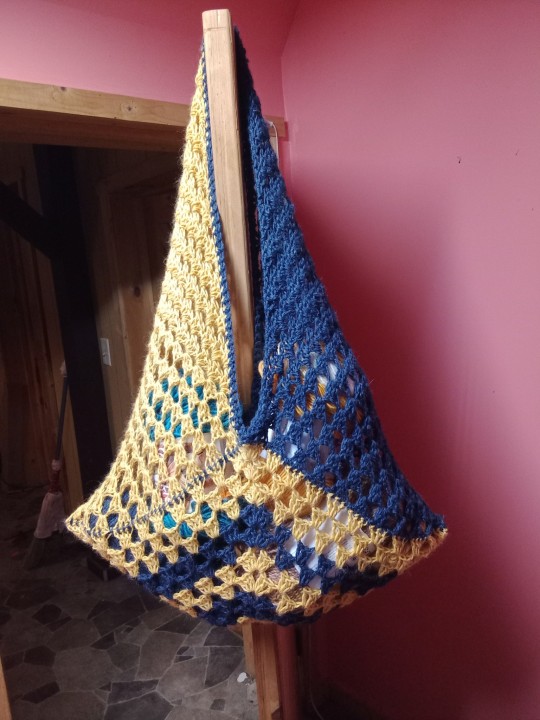
5 notes
·
View notes
Text
Why is Spun Polyester Yarn the Preferred Choice for Textile Industry in India?
In the intricate tapestry of the textile industry in India, one thread stands out as the preferred choice for manufacturers seeking durability, versatility, and quality: Spun polyester yarn. As we unravel the reasons behind its dominance, we discover why producers, such as SD Polytech, a leading yarn manufacturer Delhi, continue to play a pivotal role in this fabric of success.
Exceptional Strength and Durability
Spun polyester yarn is renowned for its remarkable strength and durability. In the demanding landscape of the textile industry, where fabrics endure constant stress and strain, this yarn emerges as a reliable choice. Garments and textiles crafted with it exhibit superior resistance to wear and tear, ensuring longevity and customer satisfaction.
Versatility in Applications
Spun polyester yarn producers in India cater to the diverse needs of the textile industry. From fashion apparel to industrial fabrics, this yarn seamlessly integrates into various applications. Its versatility makes it an ideal choice for a wide range of products, allowing manufacturers to explore creative avenues without compromising on performance.
Color Retention and Vibrancy
The vibrancy of colors is a hallmark of quality textiles. Spun polyester yarn excels in color retention, ensuring that fabrics maintain their original brilliance even after multiple washes. This characteristic is crucial for the fashion industry in India, where vibrant and long-lasting colors are synonymous with the cultural richness embedded in textiles.

Resistance to Wrinkles and Shrinkage
In a country with diverse climates like India, resistance to wrinkles and shrinkage is paramount. Spun polyester yarn provides textiles with excellent shape retention, making it well-suited for garments that need to withstand varying environmental conditions. This resistance enhances the overall appearance and wearability of the final product.
Cost-Effective Manufacturing
Efficiency and cost-effectiveness are key considerations for textile manufacturers. Spun polyester yarn producers in India like SD Polytech, align with these priorities. Its availability in bulk quantities and the ability to integrate seamlessly into modern manufacturing processes contribute to streamlined production, minimizing costs without compromising on quality.
Environmental Sustainability
As environmental consciousness grows, Spun Polyester Yarn's eco-friendly attributes become increasingly significant. Its production process consumes less water compared to natural fibers, and its durability reduces the frequency of replacements, contributing to a more sustainable and eco-conscious textile industry.
Conclusion
In essence, the prevalence of Spun Polyester Yarn in the textile industry in India can be attributed to its exceptional strength, versatility, color retention, resistance to wrinkles, and cost-effective manufacturing. SD Polytech and other spun polyester yarn producers in India play a crucial role in weaving success for textile manufacturers, providing them with a thread of excellence that strengthens the fabric of India's rich textile heritage.
Also, Read:
The Advantages of Using Polycotton Knitted Yarns in Textile Manufacturing
The Rise of Yarn Manufacturing in India: A Historical Perspective
Originally Published by: https://sdpolytech.blogspot.com/
2 notes
·
View notes
Text
attempting another raglan knitwear item [screaming and crying car crash sound effect cat yowling glass breaking]
#so far have had no luck with raglans. right now. i have the right amt of stitches just not in the right places#but its ok bc it 1 misplaced stitch which should be in the front but fsr is in the back. no harm done i can live w 1 st#im mostly also bad at being patient enough to achieve gauge#like . its ok i have a 90% accurate stitch gauge and a 115% row gauge#which like is perfectly plenty but i am gonna have to do some quick math later on bc it says to knit until it measures 12 cm#but there are still some 20 odd rows to go (with increases) and im already at 5 cm#and the gauge also said 22 rows = 10 cm so like idk i do think something's not quite right there vis a vis measurement but whatever#i just really hope it works out pls god let it work out im using such a cute yarn combo#im holding 5 strands of yarn btw which is so fucking stupid especially bc one of the yarns is one i recuperated from a sweater and split#horrendously but its SO beautiful its like a yellow cotton polyester blend (or viscose icr) and its like silky soft and gorgeous#but also entirely split into like 6 strands or smth plus the shiny strands that make it so soft keep getting caught on my dry hands#and i dont even have that dry hands but like anyway point being im giving myself a headache inducing task#and i hope it works out#i also should perhaps do a crochet raglan cause its . easier. and i care slightly less abt crochet so i wouldnt mind fucking up
3 notes
·
View notes
Text
These aren't socks but slippers.
Today I found out that yarners think crocheting socks is subversive and controversial and I just…on one hand, why the fuck not, I guess yarners are allowed to have their controversies, but on the other, how much time do you have in your FUCKIN DAY??
137K notes
·
View notes